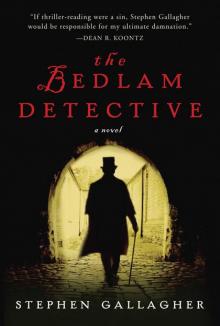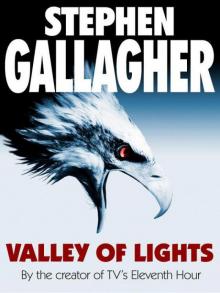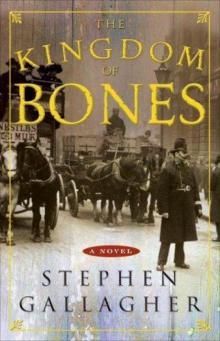- Home
- Stephen Gallagher
The Boat House Page 2
The Boat House Read online
Page 2
"Think you'll make it?" Wayne said.
"Are you kidding? She's running like a dream."
Wayne stepped back, so that he could take the whole car in at once; the pitted grille, the yellowing headlamps, the small chip crack in the windshield that had never quite become bad enough to star, the wrapping of black tape that held the radio aerial into the bodywork.
"Yeah," he said, finally and with distaste. "I had a dream like that, once." And then he moved to open the workshop's big double doors as Pete got in behind the wheel.
Ted bent to speak to Pete through the car's half open window. "Anyway," he said quietly and seriously, "I'm sorry about your mother."
"Yeah," Pete said. "We could see it coming, but…" And he shrugged; it was a thought that he'd been unable to complete in any satisfactory way since the news had first come through, in a phonecall from Michael three days before.
Ted took a step back; Wayne now had the doors open to the darkness, standing just inside the workshop and trying not to shiver in the March night's chill. Pete nodded to Ted and smiled briefly, and then he reached for the key to start the engine.
The Zodiac eased out into the lake-misted night, smoothly and in silence.
It moved in silence because Ted and Wayne were pushing it; Pete's earlier attempts had run the battery down, and the jump-starter was way over on the marina side of the yard. Grunting and wheezing, they got him across the dusty forecourt and onto the stony track that went on to the main road, and after a few yards the engine kicked and turned over and coughed into a ragged kind of life. On came the lights, making sudden and bizarre shapes out of the boat hulls, trailers, and half-dismantled cruisers that were crowded in along the trackside verge, and then the car was out from under their hands and pulling away as the two of them stopped to catch their breath.
They watched his tail lights all the way down the track, until they started to flicker as he made the turn around behind the trees. A few moments after he'd gone from sight, there came a faint singsong vibration of tyres on metal as the Zodiac crossed the iron bridge that was their link to Three Oaks Bay, the lakeside resort which brought the yard most of its business. The sound lasted less than a second, and left silence behind.
Ted put his hand on Wayne's shoulder as they turned to go back inside.
And then he winced as, somewhere far off, there was a loud backfire. The high valley sides caught and echoed it, like a gunshot deep in some vast, empty building.
"Don't worry," Wayne said. "Think of it as advertising."
"In what way?"
"If he can keep that old heap on the road, he can probably fix anything on wheels."
Wayne closed the big workshop doors, and turned the handle to lock them from the inside. Ted stood by the smaller back exit, his hand ready on the light switch. He was thinking that things were going to seem strange around here for a while, with Pete away. He had another mechanic, a quiet, intensely private man named Frank Lowry, but their relationship wasn't the same; in the four years since he'd joined them Pete had become more like another son to him, and almost like an older brother to Wayne. Maybe it wasn't your standard family unit, but in a world where it seemed that just about everyone was damaged goods in one way or another, they'd made themselves a fairly happy corner of the junkheap.
It wouldn't last forever, of course, because nothing did. Wayne was starting to spread his wings a little, swapping Custom Bike for Playboy and getting into a relationship with a girl named Sandy which seemed to consist mostly of baiting each other and trading insults and playing music somewhere around the pain threshold. And Pete; Pete, eventually, was going to hook up with someone who really appreciated him, and then it would be goodbye to those evenings of beer and popcorn and frozen pizza and rented videos, and all those other little touches that made up a uniquely masculine view of the Good Life. Both of them would leave him, and then he'd be alone.
But maybe not this year, was his consoling thought as they moved out into the main part of the yard and he closed and locked the door behind them. It wasn't much of a lock, but then it didn't need to be; Chuck and Bob, Ted's two German shepherd dogs, were let to run free in the yard on all but the coldest of nights. Survivors will be prosecuted, Wayne had once chalked on the main gate, but then Ted had made him clean it off.
Wayne Hammond was a likeable boy, much as his father had been at the same age. He wasn't academically bright, but he was sharp in all the ways that counted. He was taller than his father, with a lithe swimmer's body and an averagely pleasant face that wouldn't break any hearts — but then it wouldn't stop any clocks, either. Ted would look at him sometimes and, just for a moment, he'd see the boy's mother again.
As the two of them crossed the yard to their unlit house — Wayne going along to raid the fridge before returning to his two-roomed teenager's den above the workshop — the woman who would bring disaster to their lives and to the valley was making a crossing of a different kind, more than two thousand miles away.
Nikolai had done little more than to sit watching her for the first couple of hours, until he'd realised that he was making her nervous. That was when he'd moved from the fold-down seat to lie full length on the compartment's upper berth, leaving Alina below to gaze out of the window at the passing landscape. This was continuous and unvarying, birch and pine forests standing dark in the moonlight; occasionally the trees thinned out for settlements of low wooden houses with small-paned windows and snow laden roofs, but for the most part it was just a rolling backdrop for their dreams and fears.
He adored her. One dream, at least, seemed to be coming true for him.
He was nervous about their situation, but nothing more. This wasn't like the dark old days, where people were let out grudgingly if at all and then only with the certainty of family ties to draw them back; Nikolai knew that, had he chosen to travel alone, he'd almost certainly have faced no difficulty in getting permission. Border controls were easing, the Berlin wall had fallen, there was a different kind of outlook all around. The problem lay with Alina; she'd some kind of a criminal record and she'd told him that there were charges still outstanding that she'd have to answer if ever they caught up with her. He'd never asked her what the charges were. He trusted her.
But he knew that she'd spent time in a prison psychiatric hospital, and that she'd slipped out on a technicality and they wanted her back, and that before he'd met her she'd already lived without a permanent address or identity for at least two years. He couldn't imagine himself surviving in that way, but he could see what it had been doing to her. There was no question about it, she had to get away; and after he'd known her for only a short time, there had been no question but that he'd have to go with her.
A sharp rap on the wall by the door brought him slithering down from the berth. Alina was already standing as the guard came in, a boy soldier in an iron grey uniform and with a deep cheek scar like a cattlebrand. He was carrying a short stepladder in one hand, their passports in the other; after setting the ladder down he read out the names on their papers, mispronouncing them, and then turned to the photographs. They were French passports, guaranteed stolen but not yet reported, and the flimsy visa forms inside were simple forgeries.
There wasn't much room. Alina was standing close beside Nikolai, her head only just level with his shoulder, and she was looking at the floor. Nikolai felt a small flame of apprehension coming to life inside him at this, and the flame became a steady heat as the guard — barely out of school but already as tough and as ugly as a board — looked up from her picture to find her avoiding his eyes.
Nikolai began to feel scared.
It wasn't as if he needed to be here. He'd chosen to be here, gone out of his way to take the risk, elected to travel on forged documents instead of legitimately under his own name because it meant that Alina would be less conspicuous than if she made the journey alone; but if her nerve folded now, if she gave them away, it would all be for nothing.
Alina lifted her head, and retu
rned the guard's level stare.
Everything fell back into place. Her self possession was as cold and as hard as the light of a star. She was around twenty-eight, perhaps a little more; it was hard to tell because she was small and slim with a dancer's compact grace and a clear north country skin, a feature that still caused her to be mistaken for a teenager almost everywhere that she went. Her hair, not quite shoulder length, had been tied back. It had been longer, once, but in one of those rare moments where she'd unwound a little and told him something about herself he'd learned that they'd cut it short during her time in the hospital. He tried to imagine her like that, gaunt and defeated, but he couldn't.
The worst was over. The boy soldier handed back their passports and then hopped up onto his ladder to check the luggage rack and the vent seals. He then unhooked a flashlight from his belt and shone it into the space under the lower bunk; this ritual completed, he stepped out into the corridor and closed the door on them.
There was no baggage check.
The train rolled on slowly.
Alina lay back in the shadowed corner of the lower berth, and this time Nikolai sat beside her. The scene outside grew more and more empty, the forests cleared back from the trackside in a sure sign that the border was approaching. He saw the ruined remains of old concrete bunkers, many of them roofless and all of them half buried in the snow; the train glided on in near silence past the tracks of earlier ski patrols and the occasional bulldozed vehicle road, the snow thrown up at its sides like dirty concrete.
There was daylight in the darkness as they came under the first of the searchlight gantries. These straddled the track every fifty metres or so, and the effect was of a slow pulsing as the thousand-watt arrays passed over. There were other lines here with other trains, all of them freightcars and none of them moving; it was like a forgotten railyard, the place where all the ghost trains ended their runs, the only sign of life a small fire that had been lit under one of the diesel engines to free its iced up brakes. The fire's attendant was a silhouette that stepped out to watch them go by, an eyeless, faceless shadow of a man.
Alina hitched herself up, and moved closer to the window.
The train was slowing in its river of light. At this moment they were being watched from a two-man tower out across the tracks, a dark shape sketched in darkness that stood taller than the pines. Alina stared out at the tower; even in this harsh gantry light she was a wide-eyed madonna, and Nikolai felt his heart turn over. He couldn't understand her power over him, and had no urge to; if he was a lost soul, then he was grateful to be damned.
They stopped briefly in a wooded clearing so that the border control people could disembark. The train was already rolling again as the officials trudged off in ranking order, the two junior soldiers last in line; they were filing down a snowcut path toward a green-painted building about a hundred metres away, and then the trees closed in again and they were gone.
Alina was now staring into the reflected eyes of her own, ghost-glass image.
"Don't celebrate too soon," she said; perhaps to Nikolai, perhaps more to herself. "I've been this far before."
He wasn't aware of having fallen asleep. But when he woke the train had stopped, and Alina was already up and buttoning herself into her midlength overcoat. He looked out. By now the darkness had given way to that strange northern twilight that took a little of the colour out of everything but which sharpened up edges and outlines and presented them in a range of greys that shone like opal. It wasn't daylight — it wasn't even full dawn — but daylight couldn't be so far away.
"What's happening?" he said, but she didn't give him a direct answer.
"Get the bag," she told him.
The pre-dawn chill began to seep into them from the moment that they took the long step down from the carriage. Nikolai paused to look around, his breath misting in the grey air as he tugged his gloves on a little further and zippered his overjacket a little tighter. At first glance they seemed to be at an anonymous spot in the middle of nowhere, endless woodland crowding right up to the trackside and cutting off any chance of seeing what lay beyond. Further along the track, a crowd was gathering by the engine. Alina was already heading to join it.
He hurried to catch up.
He was walking on snow-covered gravel that had been stained brown with the throwoff of the passing trains. There were faces at most of the windows above him, and people were hanging out of the open doorways at the carriage ends as they craned to see what was going on. Everybody seemed dazed, rumpled, slightly shocked to find themselves active and awake at such an hour.
He and Alina joined the crowd, stepping over the collapsed wire of the woodland's boundary fence so that they could circle around and get a better view. Two Finnish policemen in fur caps and cold weather gear were doing their best not to argue with five of the railway's people, all of whom were looking around anxiously when not taking a turn at protesting. Glancing around, Nikolai could now see that they weren't in the middle of nowhere after all but on the outskirts of a small township of wooden buildings, a few brick sheds, and a grey metal radio tower; the Poliisi van had been moved in to block the train on the township's solitary level crossing.
Keeping his voice low, Nikolai said, uncertainly, "They're not searching."
But Alina was looking past hope, to harder possibilities. "No," she said. "But they're waiting for someone who will."
It was hard to know what to do. Some passengers were drifting back to their compartments as the cold worked its way into them, and others were taking their places. Two or three men were tramping off into the woods to relieve themselves out of sight of the train, but everyone could see them go.
The sounds of cars, being driven hard.
They came around the bend, three of them with their lights full on, and at the sight of the van they had to stop suddenly with a squeal of snow tyres and a cloud of road grit. They didn't look like police cars, just ordinary saloons. There were four men in each. They started to get out.
Nikolai could hardly believe what he was seeing. They were Russians, not military or border patrol but just the ordinary militia, on the wrong side of the frontier in cars with Soviet registrations. Some were still in police uniform, and had thrown on anonymous-looking topcoats as if in an attempt at disguise; they looked around nervously as they stepped out by the rail tracks, aware that they were off home territory and in what was potentially a diplomatic minefield.
Their leader was an older man in plain clothes, overdressed even for this kind of weather; a raincoat over a heavy topcoat, which in turn was over a jacket and at least two baggy sweaters. Everything was unbuttoned, his scarf hung loose, and still he appeared to be steaming. His old fashioned spectacles had one milky, sandblasted lens as if he'd lost an eye or, at least, the use of it. He approached the Finns and started to talk. The Finns didn't look happy. Cross-border cooperation, it seemed, was being pushed to the limits and beyond, here.
Nikolai said, "None of them knows us."
"Yes, they do," Alina said. "Pavel's with them."
She was looking at the last of the three cars. Nikolai followed her gaze and saw a young Russian policeman of the lowest rank, the last to climb out; he was scanning the windows of the train and in his eyes was a certain desperation, as if his presence here was the result of a drive beyond that of uniform and duty.
If he should happen to lower his gaze to the trackside crowd, he'd see them in moments. The Finns and their cross-border counterparts were almost arguing now and those from the cars were gathering around, but the young policeman was ignoring them — eyes still scanning the train, his lips moving slightly as if keeping a tally or reciting a prayer.
And with a quick glance around to judge the moment, Alina took a few steps backward and then turned and headed for the trees.
Realising almost too late that she'd begun to move, Nikolai followed her. A few heads turned, but the crowd mostly screened them from the police and nobody called out.
He c
aught up with her. The immediate cover was sparse, mostly leafless silver birch; Nikolai was expecting a shout at any moment, and he ran hunched as if he anticipated it coming as an actual physical blow between the shoulders. When he stumbled and slowed, he felt Alina's steadying hand on his arm. She was surprisingly strong, and she hustled him forward a little faster than he felt able to run.
They climbed. The tracks seemed a long way behind them now. One moment when Nikolai lost his footing, he almost brought Alina down with him. When finally they came to a stop they were both breathing hard, the cold air feeling like broken glass in Nikolai's lungs, but he forced himself to keep it under control so that he could look back down the trail and listen. The early-morning air was still, a silence broken only by the occasional rustling of tree branches shedding their snow.
But then, after a few moments, they were rewarded by the sound that they most wanted to hear.
The train was leaving. Without them.
Nikolai said, "Why do I get the feeling there's something you haven't been telling me?"
"There's a lot I haven't been telling you," Alina said. "Mostly for your own protection."
"So, who's Pavel?"
She looked at him, her breath feathering in the cold air. Her face was a hard, perfect mask; the face of a stranger, her grey eyes like chips of slate in the light of dawn.
"He's the one I've been living with," she said.
For Nikolai, it was as if the ground had dropped away beneath him. But then before either of them could say anything more, they were stopped by the sound of a distant whistle as it cut through the air.
Just the cry of a bird, Nikolai wanted to say, but he couldn't bring himself to believe it. Alina took the lead and said, "They guessed. They left someone."
Another whistle answered, from some way further down the ridge. This one was more distant, less expert.

 The Boat House
The Boat House The Bedlam Detective
The Bedlam Detective Valley of lights
Valley of lights The Kingdom of Bones
The Kingdom of Bones